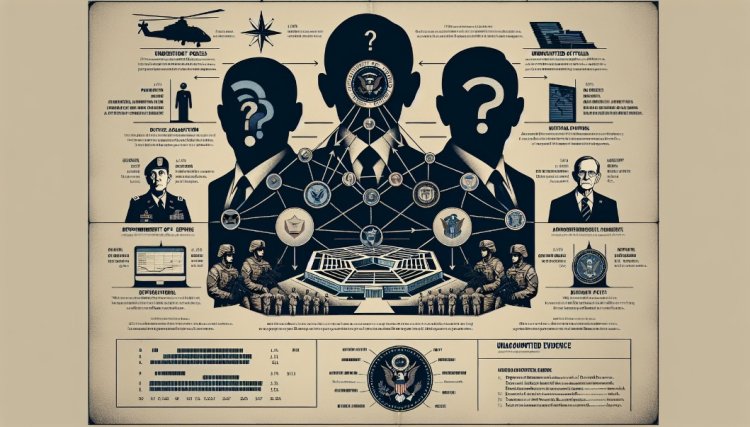Revisiting 9/11: Examining the Actions of Rumsfeld and Cheney on 9/11
Dive into 'Revisiting 9/11: Examining the Actions of Rumsfeld and Cheney on 9/11', a critical analysis of the roles played by key political figures during one of America's most defining moments. This examination seeks to uncover the decisions, actions, and potential implications surrounding Donald Rumsfeld and Dick Cheney's responses to the tragic events of September 11th.

Introduction
The importance of examining the events of 9/11 cannot be overstated. Even though some may consider it to be yesterday's news, 9/11 continues to play a pivotal role in global geopolitics. We mustn't forget the impact of this tragic event and its continuing significance.
In today's discussion, I will be focusing on the actions of two key individuals: former Defense Secretary Donald Rumsfeld and former Vice President Dick Cheney. Both individuals held positions of great responsibility on the day of 9/11, and their actions – or lack thereof – warrant thorough examination.
However, it is important to acknowledge the limitations of the investigation surrounding 9/11. Given the time constraints and the vast amount of evidence that would be needed for a comprehensive answer, I will be concentrating on the actions of Rumsfeld and Cheney and their implications.
Donald Rumsfeld, as the top-ranking executive officer in the Department of Defense, was second only to the president in the military hierarchy of the United States. Alongside President Bush, Rumsfeld had the power of the National Command Authority, including joint control over the decision to launch a strategic nuclear weapons strike.
On the other hand, Vice President Dick Cheney's whereabouts and actions on 9/11 are still subject to conflicting evidence. The 9/11 Commission's own final report acknowledges this discrepancy and leaves it unresolved.
Despite these limitations, a careful study of Rumsfeld and Cheney's actions on and around 9/11 will shed light on their areas of responsibility, decisions made, and orders given. It is my belief that this examination will lay the groundwork for a potential criminal investigation into the lives lost at the Pentagon on that fateful day.
It is worth noting that the investigation into the Pentagon attack faces significant challenges. The actions of Rumsfeld and Cheney during the lead-up to the attack, as well as their response to it, raise concerns about their involvement and potential interference with the air defenses that day.
Furthermore, the issue of the Pentagon's budget analysis cannot be overlooked. Rumsfeld was dealing with a massive accounting scandal, with billions of dollars unaccounted for in the defense department's budget. This financial pressure may provide a plausible explanation for why the Pentagon was targeted on 9/11.
As we delve deeper into this investigation, it becomes evident that an honest criminal inquiry is necessary to uncover the truth behind the events of 9/11. Only by seeking justice and reconciliation can we hope to create a future of peace and stability.
By shedding light on the complicity and cover-ups surrounding this tragic event, we can strive for a better world in the years to come.
Rumsfeld's Actions
Donald Rumsfeld held a crucial position as the top-ranking executive officer in the Department of Defense on September 11, 2001. As per the US code, he was second only to the president in the military hierarchy of the United States. With this position, Rumsfeld had the power of the National Command Authority, which included joint control over the decision to launch a strategic nuclear weapons strike.
During the attacks, President Bush was not in a position to make decisions, leaving Rumsfeld as the highest-ranking military authority. This meant that he was the only one with the authority to issue a shoot-down order. The 9/11 Commission's final report acknowledges the conflicting evidence surrounding Vice President Cheney's whereabouts and actions on that day, leaving Rumsfeld as the key figure in the military chain of command.
Rumsfeld's response and actions during the attacks raise concerns about his involvement and potential interference with the air defenses that day. Despite being aware of the attacks, Rumsfeld made no attempt to coordinate a response or establish details of the flights involved. Instead, he continued with a regularly scheduled meeting with a CIA briefer, demonstrating a lack of urgency in dealing with the unfolding crisis.
Furthermore, during the crucial window of time that Flight 77 was approaching the Pentagon, Rumsfeld actively deflected attempts by his staff to engage him in the crisis management process. Instead, he proceeded with his business as usual and participated in a photo opportunity on the lawn of the Pentagon, assisting first responders in carrying the wounded into an ambulance.
It is worth noting that Rumsfeld's actions during the attacks are well-documented and not a matter of controversy. His own statements to the 9/11 Commission confirm his whereabouts and actions on that day. However, his inaction and failure to exercise his authority as the highest-ranking military officer raise serious questions about his response to the attacks.
One possible explanation for Rumsfeld's actions is the financial pressure he was facing at the Pentagon. The defense department was dealing with a massive accounting scandal, with billions of dollars unaccounted for in its budget. This financial strain may have provided a motive for targeting the Pentagon on 9/11.
In conclusion, a thorough examination of Rumsfeld's actions on and around 9/11 reveals his areas of responsibility, decisions made, and orders given. His response, or lack thereof, during the attacks, raises concerns about his involvement and potential interference with the air defenses. The investigation into Rumsfeld's actions, along with those of Vice President Cheney, is crucial in uncovering the truth behind the events of 9/11 and seeking justice for the lives lost.
Cheney's Actions
There is conflicting evidence surrounding Vice President Dick Cheney's whereabouts and actions on the day of 9/11. The 9/11 Commission's final report acknowledges this discrepancy and leaves it unresolved. This section will examine Cheney's actions and the significance of testimony from Norman Mineta.
Conflicting Evidence on Cheney's Arrival in the Emergency Shelter Conference Room
According to the 9/11 Commission's report, it is believed that Cheney arrived in the emergency shelter conference room, also known as the Presidential Emergency Operations Center (PEOC), shortly before 10 a.m. However, former Transportation Secretary Norman Mineta testified that Cheney was already present in the PEOC at 9:20 a.m.
In his testimony, Mineta described a conversation between Cheney and a young man who informed the Vice President about the approaching plane. The young man asked Cheney if the orders to shoot down the plane still stood, to which Cheney answered, "Of course, the orders still stand. Have you heard anything to the contrary?" This conversation took place while Flight 77 was approaching the Pentagon.
The Testimony from Norman Mineta and Its Significance
Norman Mineta's testimony is significant because it contradicts the official timeline provided by the 9/11 Commission. If Mineta's account is accurate, it raises questions about the actions and knowledge of Cheney and others in the PEOC. It suggests that Cheney was aware of the approaching plane earlier than previously stated and that orders to shoot it down were given.
Mineta's testimony also indicates that communication and coordination was happening in the PEOC during the attack on the Pentagon. This conflicts with the official narrative that the government was not informed of Flight 77's approach until 9:36 a.m., leaving little time to react.
The Discrepancy between Mineta's Account and the 9/11 Commission's Narrative
The discrepancy between Mineta's account and the 9/11 Commission's narrative raises questions about the accuracy of the Commission's investigation. It suggests that there may have been a deliberate effort to downplay or ignore certain information that could have implicated high-ranking officials.
The Commission's failure to address Mineta's testimony and provide a satisfactory explanation for the conflicting evidence undermines the credibility of their final report. It highlights the need for a more thorough and impartial investigation into the events of 9/11.
The Importance of Resolving the Conflicting Evidence
Resolving the conflicting evidence surrounding Cheney's actions on 9/11 is crucial for establishing the truth about what happened that day. It is essential for accountability and justice to be served for the lives lost and the impact of the attacks on the nation.
A comprehensive investigation that addresses the discrepancies in testimony and timelines will provide a clearer understanding of the events and potentially uncover any criminal complicity or cover-ups. Only through a thorough examination can we ensure that the full truth about 9/11 is revealed and that those responsible are held accountable.
In conclusion, the conflicting evidence surrounding Cheney's actions and the testimony of Norman Mineta present a significant challenge to the official narrative of 9/11. Resolving these discrepancies is crucial for uncovering the truth and seeking justice for the lives lost on that fateful day.
Financial Scandals and Motive
One area of concern when examining the events of 9/11 is the potential motive behind hindering the air defenses on that day. This section will delve into the financial scandals surrounding former Defense Secretary Donald Rumsfeld and the implications of his involvement.
Rumsfeld's Involvement in the Defense Department's Budget Scandal
Before the attacks on 9/11, the Department of Defense was dealing with a massive accounting scandal. Billions of dollars were unaccounted for in the defense department's budget. At the center of this scandal was Donald Rumsfeld, who held a crucial position as the top-ranking executive officer in the Department of Defense.
The Unaccounted Trillions of Dollars and the Pressure on Rumsfeld
The financial pressure facing Rumsfeld cannot be overlooked. In fiscal year 1999 alone, $2.3 trillion of transactions and adjustments were improperly accounted for. The following year, $1.1 trillion was also unaccounted for. These discrepancies in the defense department's budget created a significant challenge for Rumsfeld and raised concerns about his involvement.
The Parallel with the Collapse of World Trade Center Building 7 and the SEC
Another interesting parallel can be drawn between the unaccounted-for trillions of dollars and the collapse of World Trade Center Building 7. This 47-story steel-framed office tower collapsed into its own footprint on 9/11, despite not being directly hit by a plane. The building housed the New York offices of the Securities and Exchange Commission (SEC), along with other government agencies.
While the exact number of active investigations and files destroyed in the collapse is unknown, it is estimated to be within the range of three to four thousand, potentially including documents related to the Enron scandal. The destruction of these financial records raises questions about the motive behind targeting Building 7 and hindering the SEC's investigations.
The Potential Motive for Hindering the Air Defenses on 9/11
Considering Rumsfeld's involvement in the defense department's budget scandal and the pressure he faced to resolve the financial discrepancies, it is plausible to consider that hindering the air defenses on 9/11 had a motive related to this scandal. By targeting the Pentagon, where key financial records were located, those responsible may have sought to destroy evidence and impede investigations.
It is crucial to approach this potential motive with further investigation and analysis. Although it is just one piece of the puzzle, understanding the financial scandals surrounding Rumsfeld and their potential connection to the events of 9/11 is vital in uncovering the truth and seeking justice for the lives lost that day.
Unanswered Questions and Cover-ups
As we continue to examine the actions of Donald Rumsfeld and Dick Cheney on 9/11, it becomes clear that there are several unanswered questions and potential cover-ups surrounding their actions. These issues need to be addressed to uncover the truth behind the events of that day.
The Lack of Investigation into Rumsfeld's Actions and Cheney's Conflicting Timeline
One of the main concerns is the lack of investigation into Rumsfeld's actions and Cheney's conflicting timeline. Despite their crucial roles on 9/11, there has been little scrutiny of their whereabouts and decision-making during the attacks. This lack of investigation raises concerns about their involvement and potential interference with the air defenses that day.
The Classification of Douglas Cochran's Interview and Its Implications
Another issue is the classification of Douglas Cochran's interview, a key witness who testified about Cheney's presence in the Presidential Emergency Operations Center (PEOC) before the official timeline suggests. The fact that this interview has been classified raises questions about the information contained within it and the potential implications for Cheney's actions during the attacks.
The Need for a Thorough Investigation into Rumsfeld and Cheney
Given the significance of Rumsfeld and Cheney's roles on 9/11, there is a clear need for a thorough investigation into their movements and inactions. The current limitations and discrepancies surrounding their actions raise concerns about their involvement and potential cover-ups. Only through a comprehensive investigation can we hope to uncover the truth behind their actions on that fateful day.
The Potential for an Impartial Investigation to Uncover the Truth
An impartial investigation is necessary to uncover the truth behind the events of 9/11. By addressing the unanswered questions and potential cover-ups surrounding Rumsfeld and Cheney, we can obtain a clearer understanding of their actions and motivations. This investigation would provide an opportunity to seek justice for the lives lost and ensure accountability for those responsible.
In conclusion, the lack of investigation into Rumsfeld's actions and Cheney's conflicting timeline, the classification of Douglas Cochran's interview, and the need for a thorough investigation into their movements and inactions all point to the potential for a cover-up. Only through an impartial investigation can we hope to uncover the truth behind the events of 9/11 and seek justice for the lives lost on that tragic day.
Conclusion
I would like to once again express my gratitude to the Perdana Global Peace Foundation for organizing this conference and providing a platform for further examination of the events of 9/11. The actions and inactions of Defense Secretary Donald Rumsfeld and Vice President Dick Cheney on that fateful day are crucial in understanding the truth behind the attacks.
An honest criminal investigation into 9/11 is of utmost importance. It is through this investigation that we can uncover the full extent of Rumsfeld and Cheney's involvement, potential cover-ups, and their impact on the air defenses that day. Only by pursuing the truth can we seek justice for the lives lost and prevent future tragedies.
The potential for steering the world towards peace and justice lies in our ability to shed light on the complicity and cover-ups surrounding 9/11. By delving deeper into the actions of Rumsfeld and Cheney, we can strive for a better future that is built on truth and accountability.
Further inquiry and pursuit of the truth are necessary to fully understand the events of 9/11. The discrepancies in timelines, the classification of key interviews, and the need for a comprehensive investigation all point to the importance of seeking the truth and uncovering the full story.
In conclusion, I urge for continued examination of the actions of Rumsfeld and Cheney on 9/11. Expressing gratitude to the Perdana Global Peace Foundation for their commitment to pursuing the truth, it is clear that a comprehensive investigation is needed to uncover the truth behind the events of 9/11 and strive for a world of peace and justice.



 admin
admin 










